 |
 |
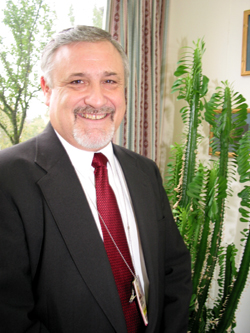
|
|
Craig Kalman, M.A., CEAP, Employee Assistance Consultant, National Institutes of Health, Bethesda, MD
|
1. I chose this career because...
2. A life-changing event...
3. My typical workday involves...
4. What I like best and least about my work …
5. My career goals are...
6. When I'm not working, I like to...
|
|
1. I chose this career because...
|
Back to Top

|

|
|
Craig Kalman works at his desk
|
I chose to become a counseling psychologist because a life-changing event (see below) prompted me to complete my graduate education and reach out to help others.
Education and Certification
- Master of Arts, Counseling Psychology, Towson State University
- Bachelor of Science, Psychology, Towson State University
- Certified Employee Assistance Professional, Employee Assistance Professional Association
College, Marriage, and Work
I started college as a physical education major at Towson State University (TSU). While there, I met my future wife, who was a nurse. In time, we got married and started a family. Since I needed an income to support my family, I quit school and went to work.
For a while, I worked as an assistant buyer for a department store. When I realized that the income was insufficient and unstable, I began to consider other career possibilities. Ultimately, I decided to become a policeman. It provided a good income and a chance to interact with people on a daily basis. After six months of training, I graduated 3rd in the academy. In just 3 years, I climbed the ranks of the department to become a detective.
An Injury, Continuing Education, and Real Estate
Then one day, while responding to a domestic dispute, I received a brutal strike to my head.
The resulting severe brain injury, and months of physical rehabilitation forced me into retirement.
Because my disability pension was not an adequate income, I decided to go back to school and complete my education.
Continuing as a physical education major was no longer possible due to my injury. I met with a school counselor to discuss other options. Ironically, she was the same counselor I had 5 years earlier. She asked me about my interests. I didn’t know what I wanted to major in, just that I wanted a good job. Psychology was a good choice for me, because I had already completed many of the education requirements of the program. I was able to graduate in two years.
After graduating from TSU, I had two choices: 1) go to graduate school, or 2) make money. I chose the second option. I joined a real estate firm and in 3 years became a broker. Eventually, I had my own successful real estate business. My specialty was residential real estate appraisal. The job required a lot of statistical analysis, which is also a task important in counseling psychology.
|
|
2. A life-changing event...
|
Back to Top

|
One day while driving home from work I became caught in slow moving traffic. There was an accident ahead. When I got closer, I saw a chalk outline on the pavement. As a former police officer, I knew what it meant – someone had died. I discovered that my son had been struck and killed by a moving motor vehicle.
Not long after the accident, I returned to TSU to work towards my masters degree in counseling psychology. I think the endeavor was partially self-therapeutic. I was faced with a sudden loss that impacted not only myself, but also my whole family. Returning to school helped me to deal with my grief and to act as an emotional support for my family. While in graduate school, I continued to work in real estate and also began doing some counseling. The more counseling I did, the more impassioned I became about the work. Eventually, I phased-out my real estate business and worked primarily in counseling.
This event changed my priorities and helped me discover more about myself. I became motivated less by making money, and more by altruistic pursuits. I began to realize how I had achieved success in my career. Certain of my skills transferred between the various jobs I had held. The common theme that ran throughout my career path was helping people. That’s what I enjoyed most.
Discovering Employee Assistance
During my last year of graduate school, I had dinner at my brother’s house one evening. He wondered about my plans after I finished school. As a human resources professional, he asked if I had considered working for an employee assistance program (EAP). I didn’t know anything about EAP. He explained that it was a service businesses used to assist their employees and family members with personal and workplace problems. The idea is to confront the problems before work productivity is hampered. Through my brother’s contacts, I was able to network with others in the field and joined a local program as a consultant.
|
|
3. My typical workday involves...
|
Back to Top

|
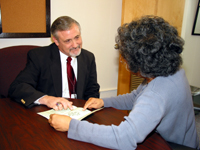
|
|
Craig Kalman assists counsels an employee
|
My typical workday is never really typical. I work for the employee assistance program (EAP, http://www.nih.gov/od/ors/ds/eap/staff.html), and every day is different.
The EAP has two major functions:
- To act as a first-line of assistance to employees in response to workplace traumatic events, such as natural disasters, homicide, or serious accidents, and
- to act as a consulting service in response to employee’s personal and job-related problems that may interfere with job performance, such as family issues, stress, alcohol or drug dependency.
My official title at the NIH is employee assistance consultant. I prefer this title to counselor, because it better reflects how we assist employees in numerous ways. Employees can come to see us about anything. Sometimes I work one-on-one with employees, or with groups. Sometimes I work with my colleagues as a team to address employee problems.
Types of concerns we can address:
· Family issues
· Relationships
· Financial
· Stress
· Grief
· Substance abuse
· Workplace conflicts
· Career planning
Ways we can respond:
· Assessment of problem
· Confidential counseling
· Mediation
· Career change or adjustment
· Referrals
· Team building
· Group management
· Training or Workshops
|
|
4. What I like best and least about my work …
|
Back to Top

|
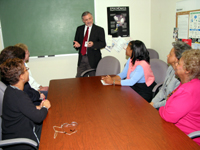
|
|
Craig Kalman discusses Employee Assistance Program strategies with colleagues
|
What I like best about my job is the opportunity to help people, and the diversity of work I do each day.
What I like least about my work is the paperwork and bureaucracy.
|
|
5. My career goals are...
|
Back to Top

|
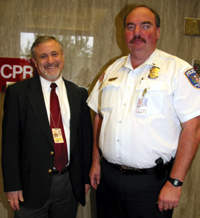
|
|
Craig Kalman stands outside of his office with a friend who works for the NIH police department
|
My career goals are to continue broadening my understanding and expertise in the field of employee assistance consulting. Recently, I have been conducting workshops on corporate motivation and stress management, and just completed one in San Antonio, Texas for a large national nonprofit organization. In the spring, I will begin working towards a doctorate degree in counseling at Argosy University in Washington D.C. I also plan to continue enjoying my music career, and seeing where that goes as well.
|
|
6. When I'm not working, I like to...
|
Back to Top

|
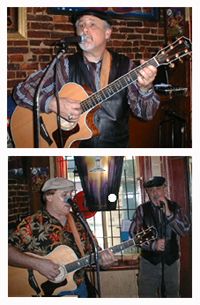
|
|
| |
Craig Kalman plays the guitar and sings with his brother at a local club
|
When I’m not working, I like to play the guitar. My brother is a good songwriter, and together we perform at local clubs as Three Down & The Moose. I’m the moose. We play some original tunes and a mix of music from the 50’s to the present, including blues, jazz, modern and pop.
My brother wrote the lyrics and music of a song about about the legendary Baltimore Colts quarterback, Johnny Unitas. In 2003, when TSU renamed their stadium in honor of Unitas, they played his original song at the dedication ceremony.
Volunteering
Some evenings and weekends, I volunteer my counseling services for retired and disabled public safety professionals like emergency medical technicians, firemen, and policemen.
|
|
|
|
 |